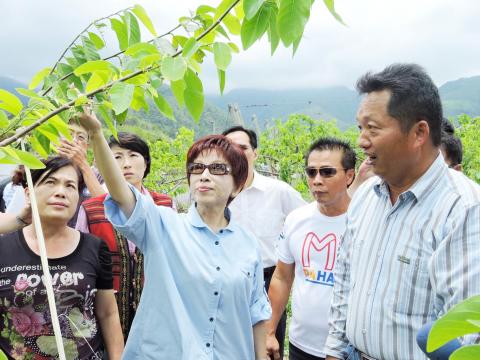Chinese Nationalist Party (KMT) Chairwoman Hung Hsiu-chu (洪秀柱) yesterday questioned the motives behind President Tsai Ing-wen’s (蔡英文) apology to the nation’s Aborigines, saying it was either a formality or a politically motivated gesture.
Speaking at a “mobile” meeting of the KMT Central Standing Committee in Taitung County yesterday afternoon, Hung blamed the Democratic Progressive Party’s (DPP) boycotts and resistance as the main reasons that some draft legislation the KMT had pushed for when it was in power benefiting Aborigines failed to clear the legislative floor.
“The KMT made unreserved efforts to take care of Aborigines when it was in office, such as the implementation of the Indigenous Peoples Basic Law (原住民基本法), the passing of a four-year infrastructure development scheme worth NT$50 billion [US$1.57 billion at the current exchange rate] and revitalizing the Comprehensive Development Fund for Indigenous Peoples,” Hung said.

Photo: Chang Tsun-wei, Taipei Times
The KMT had also worked with the legislative and administrative branches to push for the passage of the draft indigenous self-rule temporary regulations to govern traditional Aboriginal customs and the draft indigenous people’s land and ocean act, she said.
Given that the stalled passage of the draft indigenous people’s land and ocean act was a direct result of a DPP boycott, Hung said she could not help but wonder whether the apology Tsai made on behalf of the government on Monday was simply for the sake of appearances.
“Is Tsai serious about helping Aborigines, or does she have ulterior motives?” Hung asked.
Delivering on a campaign pledge, Tsai made the unprecedented apology following a ceremony in front of the Presidential Office Building in Taipei on Indigenous People’s Day, with representatives of Taiwan’s 16 recognized Aboriginal communities in attendance.
Hung later yesterday visited an Aboriginal community in Taitung, at which she said Aborigines have been the KMT’s best friends and adamant supporters, vowing to continue efforts to improve their quality of life.
“What Aborigines need is not an apology, but a government that is capable of accomplishing actual deeds,” Hung said.
Hung also visited fruit farms that were last month severely damaged by Typhoon Nepartak, calling on the public to offer more help to people affected by the storm.

An essay competition jointly organized by a local writing society and a publisher affiliated with the Chinese Communist Party (CCP) might have contravened the Act Governing Relations Between the People of the Taiwan Area and the Mainland Area (臺灣地區與大陸地區人民關係條例), the Mainland Affairs Council (MAC) said on Thursday. “In this case, the partner organization is clearly an agency under the CCP’s Fujian Provincial Committee,” MAC Deputy Minister and spokesperson Liang Wen-chieh (梁文傑) said at a news briefing in Taipei. “It also involves bringing Taiwanese students to China with all-expenses-paid arrangements to attend award ceremonies and camps,” Liang said. Those two “characteristics” are typically sufficient

A magnitude 5.9 earthquake that struck about 33km off the coast of Hualien City was the "main shock" in a series of quakes in the area, with aftershocks expected over the next three days, the Central Weather Administration (CWA) said yesterday. Prior to the magnitude 5.9 quake shaking most of Taiwan at 6:53pm yesterday, six other earthquakes stronger than a magnitude of 4, starting with a magnitude 5.5 quake at 6:09pm, occurred in the area. CWA Seismological Center Director Wu Chien-fu (吳健富) confirmed that the quakes were all part of the same series and that the magnitude 5.5 temblor was

The brilliant blue waters, thick foliage and bucolic atmosphere on this seemingly idyllic archipelago deep in the Pacific Ocean belie the key role it now plays in a titanic geopolitical struggle. Palau is again on the front line as China, and the US and its allies prepare their forces in an intensifying contest for control over the Asia-Pacific region. The democratic nation of just 17,000 people hosts US-controlled airstrips and soon-to-be-completed radar installations that the US military describes as “critical” to monitoring vast swathes of water and airspace. It is also a key piece of the second island chain, a string of

The Central Weather Administration has issued a heat alert for southeastern Taiwan, warning of temperatures as high as 36°C today, while alerting some coastal areas of strong winds later in the day. Kaohsiung’s Neimen District (內門) and Pingtung County’s Neipu Township (內埔) are under an orange heat alert, which warns of temperatures as high as 36°C for three consecutive days, the CWA said, citing southwest winds. The heat would also extend to Tainan’s Nansi (楠西) and Yujing (玉井) districts, as well as Pingtung’s Gaoshu (高樹), Yanpu (鹽埔) and Majia (瑪家) townships, it said, forecasting highs of up to 36°C in those areas